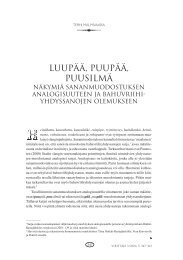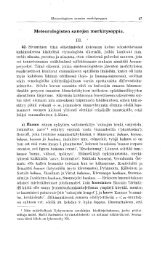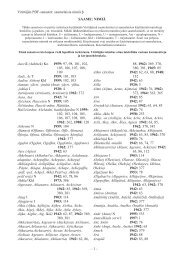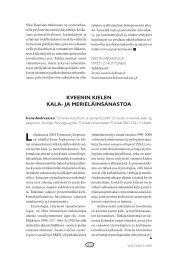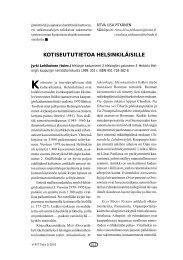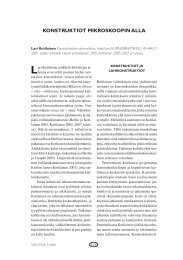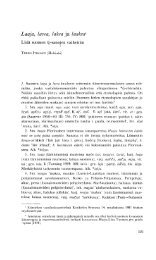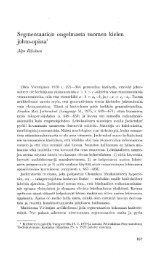pdf-tiedostona - Kotikielen Seura
pdf-tiedostona - Kotikielen Seura
pdf-tiedostona - Kotikielen Seura
Create successful ePaper yourself
Turn your PDF publications into a flip-book with our unique Google optimized e-Paper software.
TERHO ITKONEN<br />
was noticed to correspond to either an<br />
underlying intransitive subject or an underlying<br />
object; comp. the type (Emtinta<br />
on pyykin) pesussa 'the lady of the house<br />
is washing clothes', (Miehet ovat talon)<br />
rakennuksessa 'the men are building a<br />
house' in which the subject corresponds<br />
to an underlying transitive subject. This<br />
phenomenon is clearly to be associated<br />
with the competence of the speech community<br />
and is so specialised that it cannot<br />
have originated in the language<br />
without certain prerequisites. Judging<br />
from its geographical spread, symptoms<br />
of it were already in evidence in late<br />
Proto-Finnic; its having become productive<br />
probably dates back only to the<br />
time of separate Finnish development<br />
(Karlsson 1957: 163—165). In the form<br />
structure of adverbs there are three<br />
phenomena (the derivational element<br />
-e*, plurality, the external local cases),<br />
whose connection with their distribution<br />
appears to be in need of explanation. At<br />
least to some extent this distribution may<br />
be explained on the basis of the traditional<br />
semantics of nomina actionis in -e x<br />
(< -ek); in Finnish for example they<br />
express intransitive action or the object,<br />
the instrument, the result of a transitive<br />
action, but hardly ever transitive action<br />
itself. This last mentioned meaning is not<br />
found in their Lapp, Mordvin or Cheremis<br />
cognates either. Use of the plural<br />
stem, on the other hand, connects this<br />
type with many other expressions in<br />
plural local cases which simultaneously<br />
express the state of the subject: (on)<br />
jdrjissddn (iness. pi. ofjarki 'reason, sense')<br />
'(is) in possession of one's senses', puolillaan<br />
(adess. pi. of puoli 'half') 'half<br />
full', hyvillddn (adess. pi. of hyvd 'good')<br />
'to be pleased', kovilla (adess. pi. of<br />
kova 'hard') 'in dire straits', and especially<br />
the types having inessive endings based<br />
on nomina actionis kateissa 'missing' (cf.<br />
kadota 'disappear'), veteissd 'wound up,<br />
strung' (cf. vetdd 'pull'), ehdyksissd 'gone<br />
dry, depleted' (cf. ehtyd 'run dry, wane'),<br />
and saarroksissa 'surrounded' (cf. saartaa<br />
'blockade'). The greatest difficulty is to<br />
explain the exterior local case carrying<br />
in such adverbs, as it does, a different<br />
kind of temporal meaning than does an<br />
interior local case: comp. (Kangas on)<br />
kuteilla '(the cloth is) being woven'<br />
(from kutoa 'to weave') but (Hana on)<br />
veteissd '(the faucet is) turned' (from vetdd<br />
'to pull'). In any case this type began to<br />
take over the territory formerly covered<br />
by the older type (on) kulussa '(is) on<br />
the move', (on) pesussa '(is) going through<br />
58<br />
the wash', (onpyykin) pesussa '(is) washing<br />
(the clothes)' the subject of which could<br />
have either corresponded to an underlying<br />
transitive subject or an underlying<br />
object and intransitive subject (remnants<br />
of this use similar to pesussa and kulussa<br />
are still to be encountered). The basis<br />
of the new type was probably provided<br />
by some rare model constructions. Its<br />
productivity can hardly be explained in<br />
any other way than by attributing it to<br />
a cognitively based tendency to classify<br />
non-agentivity (and, by formal analogy,<br />
intransitive agentivity) differently from<br />
transitive agentivity, thus providing this<br />
class with a common linguistic expression.<br />
The continuing development was partially<br />
the inheritance of certain adverbs<br />
in the form they were, partially the<br />
creation of new ones on the basis of old<br />
ones with the cognitive tendency mentioned<br />
above supporting both inherited<br />
linguistic material and creation of new<br />
expressions.<br />
2.4.1. The same cognitive influence<br />
vnay also have made a contribution in<br />
those cases where the case of the subject<br />
was sometimes bifurcated: in affirmative<br />
normal sentences the indisputable nominative,<br />
in affirmative existential sentences<br />
the partitive or »nominative», rather<br />
accusative. Without certain prerequisites<br />
hidden in the linguistic system this bifurcation<br />
would not, however, have been<br />
able to come into being. A central part<br />
of it was the rise of the partitive to one<br />
of the cases of the subject. At the same<br />
time an earlier nominative came to be<br />
regarded as an accusative under certain<br />
conditions. As a result of this the partitive<br />
came to form a pair with the accusative<br />
along with which a comparatively fixed<br />
category of »existential» sentences has<br />
come into being with its opposing class<br />
being the category of »normal» sentences<br />
with a nominative subject. But the<br />
questions of when and how remain to be<br />
answered.<br />
The partitive subject cannot be posited<br />
as having its origin in early Proto-Finnic,<br />
because Lapp and Mordvin only exhibit<br />
subjects in the nominative. The Finnic<br />
languages provide evidence demonstrating<br />
that in late Proto-Finnic the<br />
partitive subject already appeared serving<br />
the same functions as it does in modern<br />
Finnish (cf. Denison 1957: 124—135,<br />
Hakanen 1973: 56—69). Hakulinen<br />
(1961: 46) has expressed the view that<br />
use of the partitive subject may ultimately<br />
originate in the original use of the partitive<br />
as a case of separation. The sen-



